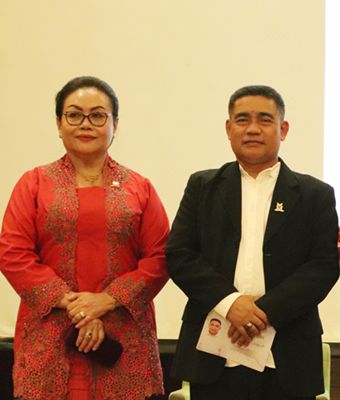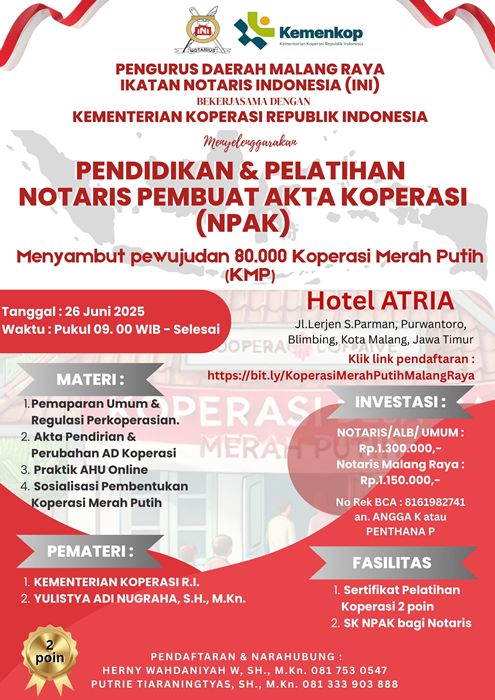From Out Side of The International Congress of Notary (UINL) in Jakarta
International Congress of the Notary, which is part of UINL (Union Internacional del Notariado Latino) which took place in Jakarta at the end of November 2019 has one of its huge intention is to maintain the Civil Law legal system which some people considers to be in conflict with the common law system. This is a little inspiration from out side of The International Congress of Notary (UINL) in Jakarta.
The civil law system is considered to have been created by Roman rulers, where they made written rules that applied to their people. The written legal system, which was codified law, was applicable in Germany, France and spread to various regions in continental Europe, such as the Netherlands which then adopted by its colonies, including Indonesia.
The question then arises, with respect to these two major legal system (namely civil law and common law) which one is stronger in practice? written / codified law or unwritten law/common law? What is the impact of the common law for the practice of a notary in civil countries like Indonesis?
The following is our interview with a senior advocate Hamud M. Balfas, SH. LLM who has worked for a long time in a prominent Law Firm in Jakarta.
medianotaris.com: With respect to common law legal system, how is the system works and where it applies in the world? Is the common law system used in business relations in Indonesia?
Hamud M. Balfas: The “common law” legal system is basically a legal system which is based on a judge`s ruling. This legal system developed first in England and then spread to its colonies such the US, Canada, India to name a few.
Basically in this legal system people will follow what has been stated / decided by judges that have been there before (precedent).
The “common law” system is different from the European (continental) legal system where everything is intentionally made and introduced in writing (written law) to be applied.
Indonesia is a country that follows a legal system that is applicable in Continental Europe, which is a legal system that is deliberately structured or codified to be applied in relations between members of a society.
In a highly connected world like today it is very possible that several common law principles apply in business relations in Indonesia. Because after all in business relations people interacts with other people and they all come from various cultural and national backgrounds.
Thus, customs and practices that exist in the business of one party that are considered good, why not just adopt such customs and practices . This customs and practices can then be converted into written law when an amendment is made to an old law.
medianotaris.com: Is that why many Indonesians study law in the US or England? When we study American law or common law, do we consider that business and other relationshipsin Indonesia often use or deal with common law?
Hamud M. Balfas: I think that assumption might not be right. Because in a business relation (especially in the form of a contract), what applies is the law that the parties in the contract chose to govern their business relation.
Students who study abroad, in my opinion, are more for their professional exposure to new things and ideas especially their future career such as how to deal with foreigners (therefore many of these students would feel more confident and more experience if they also have internships in large law offices in cities like New York, Los Angeles or London).
In addition to that, students who study abroad would like to improve their mastery of English, which is indeed the language of the business world. Once they have a good english, they would feel be much more “sophisticated” when they come home.
I happened to have also studied in the United States a few years ago. I believe students studying in the US, unless they learn something specific such as banking, capital markets or international trade, what is actually obtained in their study is not much in terms of legal material and is useful to be applied in their own country except to improve their own English skills.
Medianotaris.com: When it comes to legal certainty, which is more secure, the common law or civil law system?
Hamud M. Balfas: I think they both provide legal certainty. Because what consider a legal certainty is a matter of whether something that has been written in a contract and other form of relations are considered as law and whether or not it will be enforced consistently in accordance with what was intended by the parties. For example, when it comes to obtaining permits, regulations that are applicable for obtaining such a permit stipulates that 10,000 Rupiah has to be paid. The question is would there be other costs beyond those that have been stipulated, for example after the fee for permit of 10,000 has been paid, it turns out that the officer who handled issuance of the permit does not issue a permit within three days as determined by the regulations! And finally there are other people who tell the investors that there must be some more “unofficial” payment that the investors must pay in order for a permit to get issued quickly.
Or whether in order to enforce an implementation of something that parties have agreed upon (in case there is a dispute between the parties) especially if it has to go to court, the court will ensure that what has been agreed by the parties would be enforced as it is written or as has been decided by the court in the event there is a dispute.
medianotaris.com: Why do civil law legal system is feared to be disrupted by common law law?
Hamud M. Balfas: Actually it is only the tradition that is called “common law.” What I mean is the name “common law” has been there for centuriries or millenium. But in modern days and with an increasingly complex regulations of a problems in our society, codification (as in the Continental European system) is inevitable. Just look at laws regarding banking and capital markets in the US such as the “Dodd-Frank Wall Street Reform and Consumer Protection Act,” which was created after the 2007/2008 financial crisis in the United States. The law is almost 800 pages thick. Likewise, Securities and Exchange of 1933/1934. Or the Patent Law etc.
So in fact regulations of the problems that are exist in society (industry, trade and others) will eventually lead to the codification of the legal system because codification will provide easier guidance to the public to obtain certainty.
medianotaris.com: In November 2019 notaries around the world (from 88 countries) that adhere to the civil law system will hold a congress in Indonesia. Among the important agenda of the congres is to maintain the concept of civil law in which a notary function is very important. They are trying to strengthen the civil law system so that the role of the notary is not only a rubber stamp, but more than that, which is like the notary`s current function as a general deed official who provides legal certainty, rights and obligations of the parties. What is your comment on this?
Hamud M. Balfas: It is very important to strengthen the role of the notary public. Especially (in Indonesia case) is to make investment process in this country much more efficient as investors have been complaining on this issue for years. For example, on the establishment of a company that investor would need as a vehicle to invest their money in this country.
If I may sugggest, maybe Indonesian notaries (through INI, the Indonesian public notary association) can conduct studies with their counterparts in other countries on how to speed process of investing in a country can be made easier, cheaper and faster. Because with it status as a public official, a notary public should be able to encourage this. So far we have not seen a role of the notary here.
medianotaris.com: Separately, to what extent has the role of notaries in the capital market been to advance investment in the capital market?
Hamud M. Balfas: Frankly the role of the notary in the capital market is relatively limited if it is intended to advance investment (for example, increasing the number of investors or issuers or increasing the volume or value of transactions). But the notary may play a role in increasing disclosure (in the context of investor protection) where the role of the notary with his deeds is very important.
What I am talking here is more foreign direct investments (not equity investment in the Indonesian Stock Exchange) namely foreigners coming to this country to set up businesses and provide employments for the people.
Investors (both foreign and domestic) have been complaining about the slow process and complexity as well as the high cost of of setting up business in this country for years even decades (you can see in the world bank/IMF report on doing business). We can not even compete with countries like Vietnam and the Philipines let alone Singapore or Malaysia. I believe that the notary association (INI) should take some responsibility to provide solutions on this matter. Of course, this is not problems that must be solved by the notary alone but government should also take a decisive actions in providing better infrastructures or eradicate corruption that investors consider rampant in this country.
medianotaris.com: If I am not mistaken for an examination of a company in the context of a public offering, the one assigned is capital market legal consultant?
Hamud M. Balfas: Yes that`s true. Those who conduct legal audits of companies within the framework of disclosure for going public are legal consultants or public accountants, but documents that are examined/audited by lawyers are result of notary works such as company deeds or other agreement for business transactions.
medianotaris.com: Is the role of the notary limited to transactions that are promoting investment? If the role of a notary is needed in the framework of disclosure or openness to protect investors, how?
Hamud M. Balfas: disclosurre of the issuer process in the framework of capital market is a process in which the company “opens up” about what and who the company / issuer is. Thus disclosure/openness exists/available in company documents including notarial deeds, financial records of accountants or companies.
In light of this concept of disclosure, For example, a notary must make a deed that may not be interpreted multiply by people who reads the documents. A deed should clearly states the rights and obligations of the parties in a transaction or event (if the deed is in the form of minutes of certain events such as general meeting of shareholders).
In conducting a legal due diligence, an attorney/’legal consultant reads and summarizes and provides an opinion if there is a problem with the document deed produced by a notary.






Tinggalkan komentar